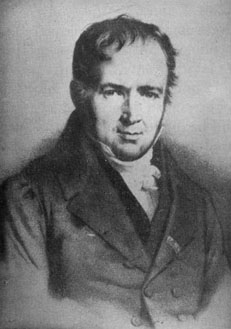| Siméon-Denis Poisson  Born: 21-Jun-1781 Born: 21-Jun-1781
Birthplace: Pithiviers, France
Died: 25-Apr-1840
Location of death: Sceaux, France
Cause of death: unspecified
Gender: Male
Race or Ethnicity: White
Sexual orientation: Straight
Occupation: Mathematician Nationality: France
Executive summary: Poisson distribution French mathematician, born at Pithiviers in the department of Loiret, on the 21st of June 1781. His father, Siméon Poisson, served as a common soldier in the Hanoverian wars; but, disgusted by the ill-treatment he received from his patrician officers, he deserted. About the time of the birth of his son, Siméon Denis, he occupied a small administrative post at Pithiviers, and seems to have been at the head of the local government of the place during the revolutionary period. Poisson was first sent to an uncle, a surgeon at Fontainebleau, and began to take lessons in bleeding and blistering, but made little progress. Having given promise of mathematical talent he was sent to the École Centrale of Fontainebleau, and was fortunate in having a kind and sympathetic teacher, M. Billy, who, when he speedily found that his pupil was becoming his master, devoted himself to the study of higher mathematics in order to follow and appreciate him, and predicted his future fame by the punning quotation from Lafontaine: "Petit Poisson deviendra grand / Pourvu que Dieu lui prête vie."
In 1798 he entered the École Polytechnique at Paris as first in his year, and immediately began to attract the notice of the professors of the school, who left him free to follow the studies of his predilection. In 1800, less than two years after his entry, he published two essays, one on É. Bezout's method of elimination, the other on the number of integrals of an equation of finite differences. The latter of these memoirs was examined by S. F. Lacroix and Adrien-Marie Legendre, who recommended that it should be published in the Recueil des savants érangers, an unparalleled honor for a youth of eighteen. This success at once procured for Poisson an entry into scientific circles. Joseph-Louis Lagrange, whose lectures on the theory of functions he attended at the École Polytechnique, early recognized his talent, and became his friend; while Pierre-Simon Laplace, in whose footsteps Poisson followed, regarded him almost as his son.
The rest of his career, until his death on the 25th of April 1840, was almost entirely occupied in the composition and publication of his many works, and in discharging the duties of the numerous educational offices to which he was successively appointed. Immediately after finishing his course at the École Polytechnique he was appointed repetiteur there, an office which he had discharged as an amateur while still a pupil in the school; for it had been the custom of his comrades often to resort to his room after an unusually difficult lecture to hear him repeat and explain it. He was made professeur suppléant in 1802, and full professor in succession to Jean Baptiste Joseph Fourier in 1806. In 1808 he became astronomer to the Bureau des Longitudes; and when the Faculté des Sciences was instituted in 1809 he was appointed professeur de la mécanique rationelle. He further became member of the Institute in 1812, examiner at the military school at St. Cyr in 1815, leaving examiner at the École Polytechnique in 1816, councillor of the university in 1820, and geometer to the Bureau des Longitudes in succession to Laplace in 1827.
His father, whose early experiences led him to hate aristocrats, bred him in the stern creed of the First Republic. Throughout the empire Poisson faithfully adhered to the family principles, and refused to worship Napoleon. When the Bourbons were restored, his hatred against Napoleon led him to become a Legitimist -- a conclusion which says more for the simplicity of his character than for the strength or logic of his political creed. He was faithful to the Bourbons during the Hundred Days; in fact, was with difficulty dissuaded from volunteering to fight in their cause. After the second restoration his fidelity was recognized by his elevation to the dignity of baron in 1825; but he never either took out his diploma or used the title. The revolution of July 1830 threatened him with the loss of all his honors; but this disgrace to the government of Louis-Philippe was adroitly averted by F. Arago, who, while his "revocation" was being plotted by the council of ministers, procured him an invitation to dine at the Palais Royale, where he was openly and effusively received by the citizen king, who "remembered" him. After this, of course, his degradation was impossible, and seven years later he was made a peer of France, not for political reasons, but as a representative of French science.
As a teacher of mathematics Poisson is said to have been more than ordinarily successful, as might have been expected from his early promise as a repetiteur at the École Polytechnique. As a scientific worker his activity has rarely if ever been equaled. Notwithstanding his many official duties, he found time to publish more than three hundred works, several of them extensive treatises, and many of them essays dealing with the most abstruse branches of pure and applied mathematics. There are two remarks of his, or perhaps two versions of the same remark, that explain how he accomplished so much: one, "La vie n'est bonne qu'à deux choses -- à faire des mathmatiques et à les professeur"; the other, "La vie c'est le travail." Father: Siméon Poisson
University: École Polytechnique, Paris (1798-)
Professor: École Polytechnique, Paris (1802-)
Copley Medal 1832
Author of books:
Traité de Mécanique (1811, science)
Théorie Nouvelle de l'Action Capillaire (1831, science)
Théorie Mathématique de la Chaleur (1835, science)
Recherches sur la Probabilité des Jugements en Matière Criminelle et en Matière Civile (1837)
Do you know something we don't?
Submit a correction or make a comment about this profile
Copyright ©2019 Soylent Communications
|